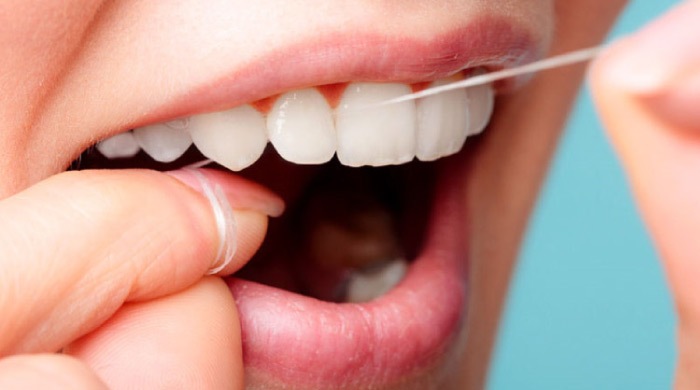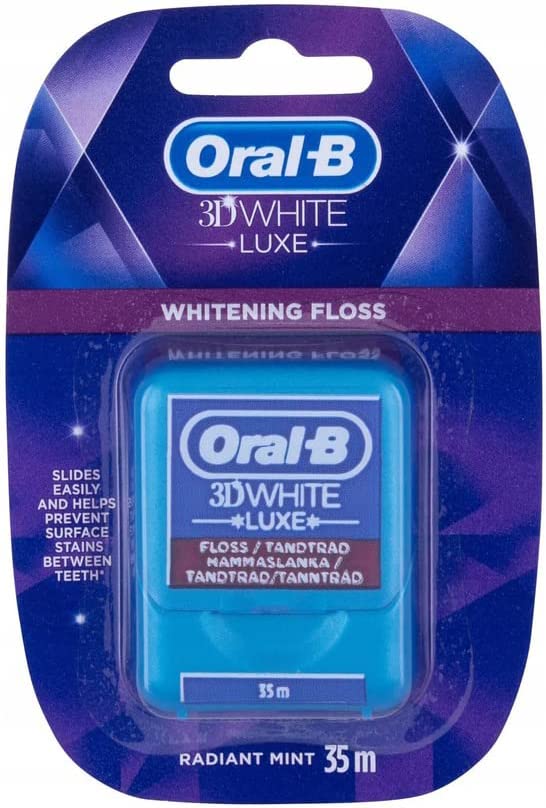When it comes to oral hygiene, there’s no denying the importance of regular flossing in keep your teeth free of those pesky plaque. And it is no secret that a beautiful, white smile can enhance your appearance and boost your confidence. But it is easy to wonder: does flossing actually whiten your teeth?
The answer: flossing will not whiten your teeth directly. The act of flossing removes plaque and food particles stuck between your teeth, which prevents the onset of cavities and gum diseases such as gingivitis. It does not cause your teeth to be whiter from the inside.
Adding on, dental floss do not contain hydrogen peroxide, the quintessential ingredient in all whitening products. It can be found in teeth whitening toothpaste, whitening strips, and even professional teeth whitening treatments; the only difference between these whitening products is the concentration of hydrogen peroxide. In general, the higher the concentration, the more effective is the whitening of the teeth.
That said, flossing does cause your teeth to be whiter indirectly by scrapping off the pesky plaque causing the discoloration from the tooth enamel. This is akin to a vacuum cleaner cleaning a rug: it removes dust and dirt from the surface of the carpet, giving a brighter and cleaner appearance.
In the rest of this article, we will take a deep dive into flossing and explore how they impact the appearance of your teeth.
Benefits of Flossing
Unlike brushing your teeth or rinsing your mouth with mouthwash, flossing is not a regular routine of many people. Yet, flossing offer numerous benefits that extends beyond the surface of your teeth. Some key benefits of flossing include:
- Removal of plaque and food particles: Flossing helps to scrape and remove plaque and food particles that are trapped between the teeth and cannot be reached by brushing alone. If not treated, the plaque can lead to tooth decay and gum diseases.
- Healthier gums: Flossing helps keep your gums healthy by removing plaque and bacteria that accumulate along the gumline. This helps prevent inflammation and bleeding, which are early signs of gum disease.
- Better oral hygiene for orthodontic patients: If you wear braces or other orthodontic appliances, flossing becomes even more critical. Food particles and plaque can accumulate around brackets and wires, increasing the risk of cavities and gum disease.
- Fresher breath: Flossing removes bacteria and debris from the mouth, helping one achieve a fresher breath.
- Prevention of tooth decay: By preventing the buildup of plaque and tartar, flossing can help to prevent tooth decay.
- Prevention of tooth stain: By removing plaque regularly, flossing can help prevent the buildup of stains on the surfaces of teeth, contributing to a cleaner appearance.
You may be interested in: Are Teeth Stronger Than Bones?
While flossing does not directly whiten teeth, it plays a crucial role in maintaining a clean and healthy smile. Incorporating flossing into your daily oral hygiene routine, along with regular brushing and dental check-ups, can help ensure the best possible dental health.
That said, it is important to not over floss as it can irritate your gum. As a general rule of thumb, one should not floss more than 3 minutes a day; anything more may risk damaging your gum and destroying the gum line.
Do Whitening Flossers Work?
Over the past few years, several oral hygiene product manufacturers have came up with whitening floss. Many of these innovative dental floss contains calcium peroxide, an inorganic compound that claims to be able to whiten a teeth by dissolving proteins molecules that causes discoloration on the tooth enamel.
Other whitening flossers are said to be coated with abrasive materials (such as silica) that grinds down and remove plaque that are stuck to the tooth enamel, much like a whitening toothpaste. So the million dollar question is, do whitening flossers whiten your teeth?
The answer is no, whitening flosser do not whiten your teeth. In fact, these ‘magical’ flossers work exactly like regular floss: they only work to remove plaque stuck between your teeth. The act of using whitening floss to remove plaque between your teeth prevents it from yellowing, but it does not make them whiter.
While it can be argued that whitening floss contains peroxide-based ingredients that can whiten one’s teeth, the short flossing time of 1 to 3 minutes do little to achieve any bleaching effect. Most over-the-counter whitening kit require a minimum duration of 10 to 30 minutes for a few days straight in order to see any noticeable results.
That being said, using a whitening flosser can still contribute to your overall oral hygiene routine. However, if you are seeking significant teeth-whitening results, you should consider using other whitening products or consulting a dentist for professional treatment options.
Now, a question you may wonder is whether whitening dental floss works better than regular floss. As of 2023, the whitening flosser is still a relatively new product and there are currently insufficient evidence or studies being done to conclude that it performs better than regular floss at removing plaque and making your teeth whiter.
All we we do know is that flossing does keep your teeth healthier, and it should be a part of everyone’s daily oral health routine.
Popular Teeth Whitening Options
There are various teeth whitening options available to cater to different preferences and budgets. These range from at-home treatments to professional dental procedures.
- Whitening toothpaste: Specially formulated toothpaste containing mild abrasives or chemicals can help remove surface stains from your teeth. While they may provide some whitening effect, it is usually less dramatic compared to other whitening methods.
- Whitening strips: These are thin, flexible strips coated with a whitening gel that typically contains hydrogen peroxide or carbamide peroxide. You apply them to your teeth for a specified amount of time, usually 30 minutes to an hour, over a period of days or weeks. Whitening strips can provide noticeable results, but the effect may not be as long-lasting or consistent as professional treatments.
- Whitening gels and trays: These at-home kits contain a whitening gel that is applied to custom or standard trays, which are then placed over your teeth. The concentration of the whitening agent in these gels is typically higher than that in whitening strips, and the trays ensure better contact with your teeth, leading to more noticeable results.
- In-office whitening: For more dramatic and long-lasting results, in-office whitening procedures performed by a dentist are an excellent option. This is usually performed by a dentist usually involves the use of high-concentration whitening agents, sometimes combined with a specialized light or laser to accelerate the process. In-office treatments offer the most significant and long-lasting results, but they are also the most expensive option.
- Dental veneers: If your teeth have intrinsic stains or discolorations that cannot be effectively treated with conventional whitening methods, your dentist may recommend dental veneers. Veneers are thin, custom-made shells made of porcelain or composite resin material that are bonded to the front surface of your teeth, resulting in a whiter and more uniform appearance.
- Natural remedies: Some people opt for natural teeth whitening methods, such as using baking soda, hydrogen peroxide, or activated charcoal. While these methods may provide some level of whitening, their effectiveness varies, and they may not be suitable for everyone.
However, keep in mind that for DIY options such as whitening toothpaste and strips, it can only provide minimal change in the color of your tooth. You should always consult your local dentist who can conduct an assessment of your teeth and oral health, and determine the best option for your specific needs.
Takeaway
In conclusion, while flossing is a crucial component of good oral hygiene, it does not directly whiten teeth. Its primary purpose is to remove plaque and food particles from between teeth and along the gumline, helping to prevent cavities and gum disease.
For a brighter, whiter smile, consider teeth whitening toothpaste, whitening strips, or professional teeth whitening treatments as they are much more effective at achieving the teeth whitening effect that many desire.
Ultimately, maintaining a consistent oral care routine that includes regular flossing, brushing, and dental check-ups is vital for overall dental health. While flossing alone may not lead to a dramatically whiter smile, it plays a significant role in keeping your teeth clean and healthy, providing a strong foundation for any whitening treatments you may choose to pursue.









